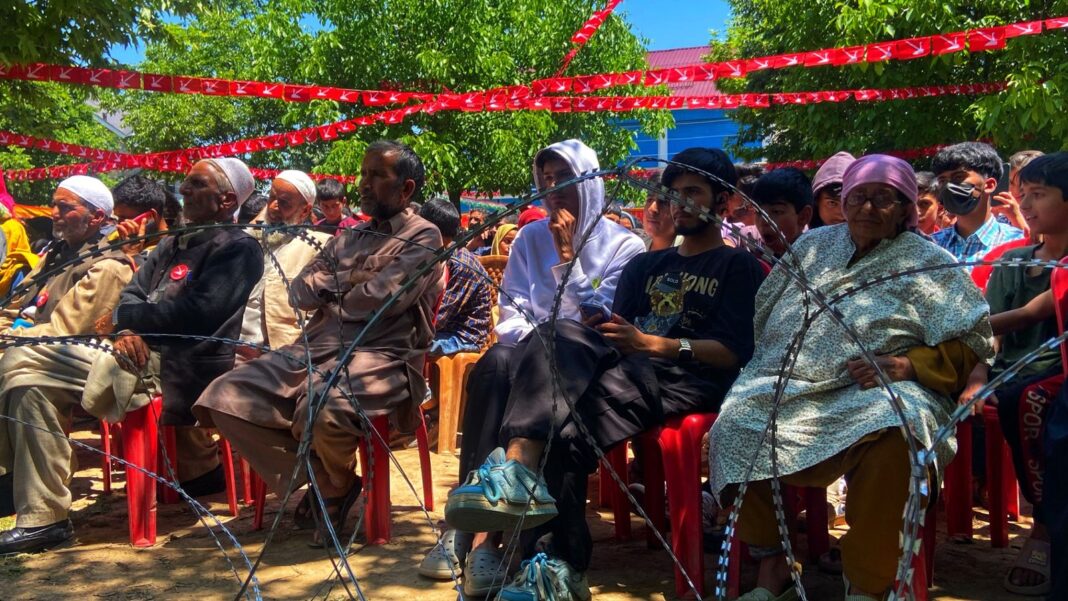On his campaign trail, Omar Abdullah – a third-generation politician and scion of the first family of Kashmir – is always in a hurry.
The 54-year-old is contesting for a seat in India’s parliament from Baramulla in north Kashmir.
With over a million voters to appeal to, Mr Abdullah sets off for 10 hours of gruelling campaigning, trying to reach as many constituents as possible.
As leader of the Jammu & Kashmir National Conference (JKNC), he has added responsibility to campaign for other JKNC candidates.
Once the only Muslim-majority state in the country, Kashmir was stripped of its special status on the 5 August 2019.
Its legislative assembly dismissed and the state downgraded to a union territory bringing it directly under the control of Prime Minister Narendra Modi’s government.
The move was deeply unpopular with the people.
In an interview at his family home in the town of Gulmarg, Mr Abdullah tells Sky News the special status protections had “basically safeguarded our identity, it safeguarded our land and our jobs, it safeguarded pretty much our existence”.
In previous elections in India, Prime Minister Modi has campaigned across the country on removing the special status (Article 370) and bringing security to the region.
However, Mr Modi and his Bharatiya Janata Party (BJP) have decided not to contest this year’s general election there.
Omar Abdullah speaks in Baramulla
Mr Abdullah says: “A party (BJP) that has contested every election (in Kashmir) since 1996 unsuccessfully, has completely disappeared this time.
“If what (they have) done is so popular, why would (they) not take this opportunity to get (their) candidates in this election?
“Being a Muslim-majority area they would have to field Muslim candidates, which might have sort of affected their narrative in the rest of the country. That’s one possibility.
“Or the second is that what they did in 2019 has been deeply unpopular and don’t want to be proven through votes.”

Indian Prime Minister Narendra Modi in Srinagar, Kashmir, in March. Pic: AP
Mr Abdullah’s campaign is essentially about self-respect, protection of the land and preservation of Kashmiri identity.
Under the special status, property, jobs, scholarships and other privileges were protected for domicile Kashmiris.
The concerns of high unemployment, inflation and cost of living are issues people talk about, but the dominant theme is the loss of Kashmir’s distinctive character.
The democratic process that suffered decades of conflict is slowly reviving.
Read more:
Muslims anxious about Modi’s expected victory
Deepfakes and influencers: The digital election in India
Can anyone beat Narendra Modi?

Omar Abdullah appears at an election event in Baramulla
More than 38% voted for the Srinagar seat in Jammu and Kashmir earlier this week – the highest amount in 35 years.
There is enthusiasm among people to participate in campaigns and political rallies.
Political analyst Bashir Manzar says: “Locals are not stakeholders in decision-making or consulted whenever laws and regulations are being framed. So they feel left out, voiceless, disempowered drastically. This election has given them a chance to come out to say we matter, our voices matter, our aspirations matter.
“Also the influence of militant guns and that leadership which called boycotts and strikes has come down drastically.”
Please use Chrome browser for a more accessible video player

3:48
India’s elections explained in maps
India Elections 2024: Why does voting take so long?
These elections are a test for further democratic exercises, a chance they have grabbed eagerly.
But the jury is out, that anyone associated with Mr Modi’s government is shunned and the electors voice that opinion in hush tones – for fear of retribution.
In a market, shopkeeper Abdul Gani says: “Even if we make a small protest, the next day we will be picked up. Here we have to remain silent. We cannot say anything.”
Please use Chrome browser for a more accessible video player

7:47
How popular is Narendra Modi?
Another man, Gulam Batt, joins in and says: “I am speaking to someone like you after many years, I feel there is some normalcy. But I am scared, maybe at night someone will come and say ‘you spoke out, come to jail’.”
Waheed Para, 34, a candidate from the Peoples Democratic Party (PDP), who contested the seat in Srinagar, knows the risks too well.
He was imprisoned for years on terror charges and says: “I’m taking a huge risk when I’m talking to you but then somebody has to stand and take risks to represent our own people.
“We are not doing anything unconstitutional or anti-India. We want the dignity of Kashmiris to be intact.”

Dal Lake in Srinagar
Kashmir is symbolic and very significant, a region over which arch-rivals India and Pakistan have fought wars.
It has been called a nuclear flash point. It is one of the most militarised zones in the region.
The elections have also heightened security concerns with more boots on the ground.
It is imperative for the government and election machinery to provide free and fair elections.
“People are feeling suffocated, there is the cycle of silence continuously being here from the last five to six years. This election in a way is an act of healing people,” Mr Para says.
Kashmiris have grappled with decades of militancy, unrest and betrayal by political regimes in Srinagar and New Delhi that have made them sceptical.
Though there have been a few instances of violence mainly against security forces its frequency has fallen considerably, including the instances of boycotts and stone pelting.
These are green shoots of people willing to put their faith in democracy for a better future.







